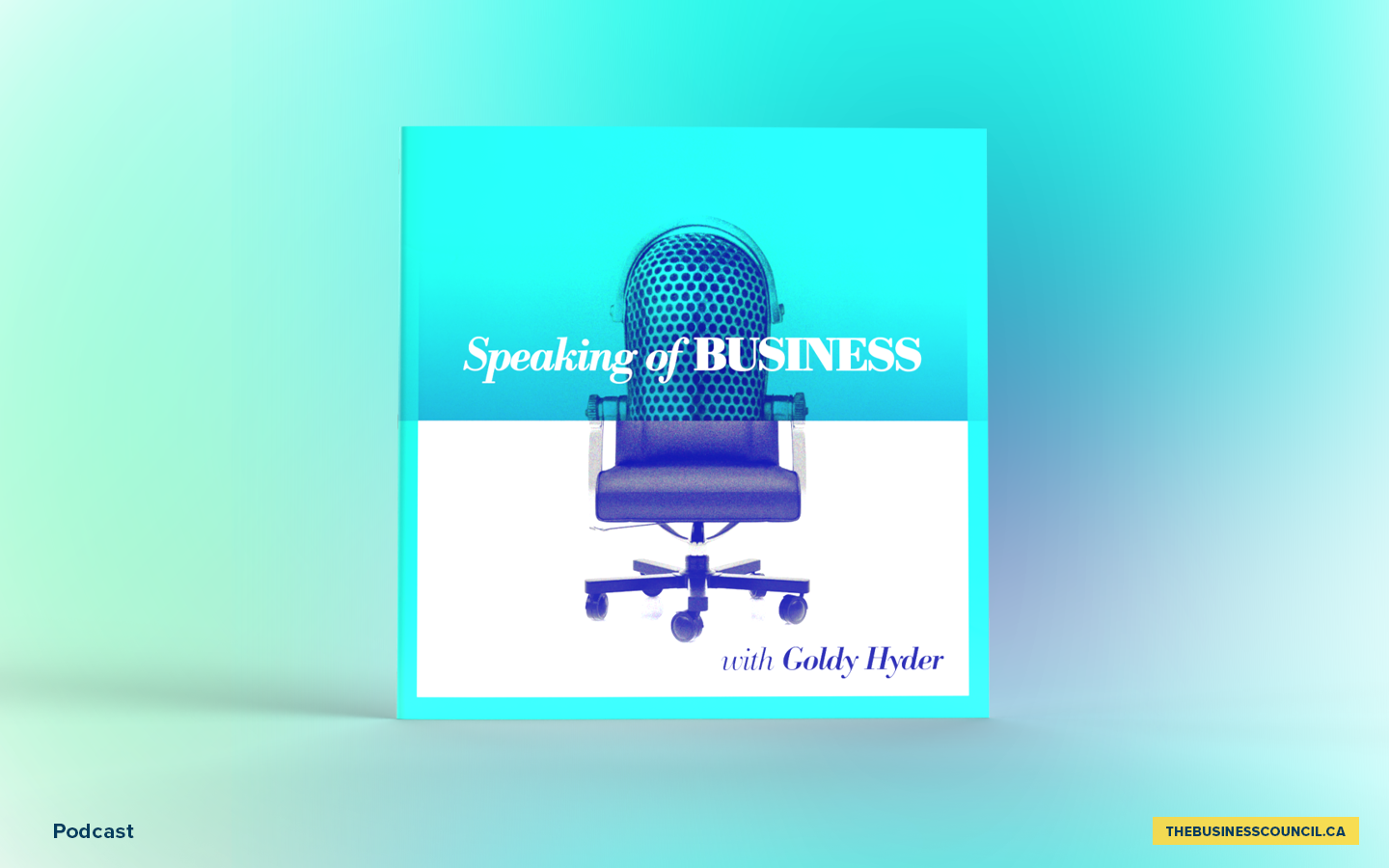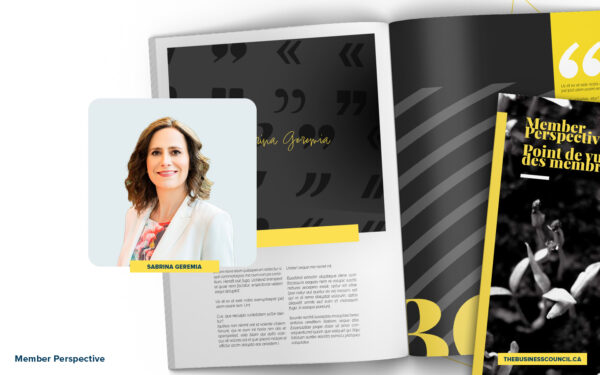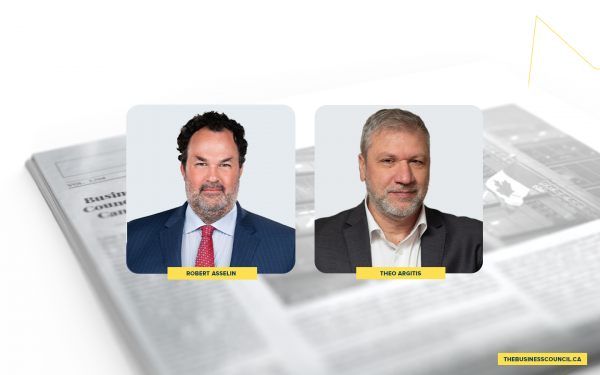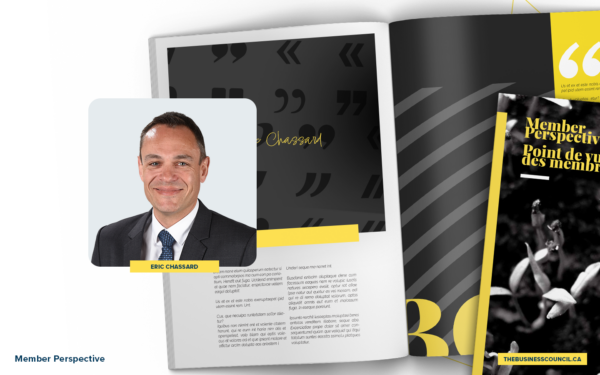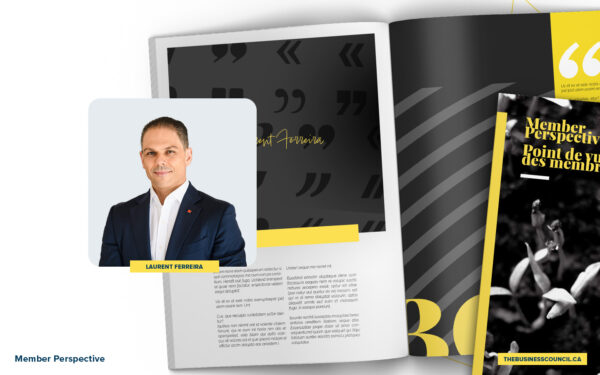We’re business people, let’s figure it out
In light of the COVID-19 emergency, we’ve temporarily suspended our regularly scheduled series of conversations with Canadian CEOs. But we’re not going away. Instead, we’re going to pivot to the health emergency itself. We’re going to explore the impact on companies and workers across the country. And we’re going to find out how business leaders are responding to crisis.
“We’re business people, let’s figure it out.” For Wes Hall, Executive Chairman and Founder of Kingsdale Advisors, the death of George Floyd was a call to action. He speaks with Goldy Hyder about July’s Black North summit, and why he’s urging corporate Canada to find solutions to end systemic racism through the creation of the Canadian Council of Business Leaders Against Anti-Black Systemic Racism.
Latest Podcasts
Transcript
Goldy Hyder:
Welcome to Speaking of Business. I’m Goldy Hyder of the Business Council of Canada. This season on the podcast, our conversations have focused largely on leadership and resilience in the face of the COVID-19 pandemic. We have heard many business leaders outline their solutions to tackling this unprecedented health and economic crisis. But today, we’re talking about leadership in the face of a very different and far more long-standing challenge, that of systemic racism.
Goldy Hyder:
The death of George Floyd at the hands of Minneapolis police last month led to anti-racism protests around the world. For Wes Hall, it was a call to action. The Executive Chairman and Founder of Kingsdale Advisors chose to speak out, first with a powerful opinion piece in The Globe and Mail titled “When I look in the mirror, I see George Floyd and so do others”. This article led to the creation of the Canadian Council of Business Leaders Against Anti-Black Systemic Racism, of which he is Chairman and Founder and on July 20th, the group will hold its inaugural BlackNorth summit, bringing together business leaders to find solutions to removing anti-black systemic barriers.
Goldy Hyder:
What role can corporate Canada play in finding solutions to this problem? Let’s find out. Welcome to the podcast, Wes.
Wes Hall:
Thanks, Goldy.
Goldy Hyder:
Well, look, let’s start with the question I just asked. Why do you think corporate Canada can find solutions to this issue of systemic racism?
Wes Hall:
I use the COVID-19 case as a parallel case because a few weeks ago, just weeks ago, we were thinking about we couldn’t leave our homes. We were thinking that we’re all going to die if we do and we got together collectively and six weeks later, businesses are opened up and no one’s worried about dying anymore. So if we can use that approach to something as dire as the COVID-19 pandemic, why can’t we use it to tackle the injustices caused by content like black systemic racism?
Goldy Hyder:
Well, you said to me when we spoke a couple of weeks ago that you felt that this issue has been given ample opportunity for politicians and others to address and you feel that, now, the business community can take a very business approach to this issue. What do you mean by that?
Wes Hall:
Well, as business leaders, we come across all kinds of problems and they just pop up every now and then and we have to solve them and solve them really quickly. So we’re used to solving really deep-rooted problems and we figured if we do something different, which is take the business approach to solve a social problem, who knows, maybe we can actually get something done. So that’s why I feel that if we can talk to a bunch of business leaders and show them what the issues are and say, “How can we work together collectively to resolve them?” I think we can make some headway into this major, major pandemic.
Goldy Hyder:
It’s interesting how you referenced that this happened in the middle of a pandemic at a time in which we were all told to stay inside and yet these rallies and these protests, they just grew and grew and grew and went global. Do you feel that there’s something symbolic here in terms of the timing of this event? Why now?
Wes Hall:
Yeah. Listen, over the years, history tells us that there’s always been protests for racial injustice. We saw that, for example, in 1960 at the Olympics where there’s about 4,000 students who were murdered because they were protesting the Mexico Olympics’ racial injustice. We saw the situation of the two Olympians that put their fist up and they were expelled from the Olympics. We saw the movement in the ’60s, in 1965 and so on. So we’ve seen this before.
Wes Hall:
I think what’s different this time around is the age of the people that’s in the street protesting and also the nationalities, the race. They were mostly young, mostly white and they were doing it at a time when the government and everyone was saying, “If you go outside, you might get this dangerous disease and you might die.” In spite of that, these young people are saying, “I am going to run the risk of dying because I’m not going to watch this anymore.” So I think it’s a powerful message that they’re sending to all of us that we need to pay heed to.
Goldy Hyder:
Give us a sense of the problem, Wes. I think the black population in Canada is about two to three per cent of our population, significantly higher in the U.S., I think at about 12, 13 per cent. Where is this issue in Canada? How alive and real is it compared to what we see in the U.S?
Wes Hall:
Well, in Toronto, we have 10 per cent of the population is black and the rest of Canada is 3.5 per cent, so it’s a pretty decent number. I often hear people say that it doesn’t really happen in Canada, it’s kind of a U.S. Problem but we’ve had racism in Canada for a very, very long time. It’s a part of her history. I did some research and, back in the day, they used to sell slaves back and there’s ads in a Nova Scotia Gazette selling slaves and words like, “Negro boy for sale, 16-years-old, in good condition.” We had the No. 2 Construction Battalion in World War One that they wouldn’t allow them to fight in the war because they were told that it’s a white man’s war. The house I live in Rosedale, in fact, the family’s, way back when, used to own slaves. They owned six slaves in this house.
Wes Hall:
But coming to recent times, for example, we saw in the newspaper, situations where, at a construction site, there were two nooses found at the workstation of two black workers. This is just a few weeks ago. So these things actually happen. It just not as pronounced but it’s actually behind the scenes which makes it even more dangerous.
Goldy Hyder:
Yeah. Speaking of which, you just mentioned, you have a home in the prestigious neighbourhood of Rosedale. There’s a couple of stories you’ve told about when people come to your door, what happens and also you as a very successful lawyer in Toronto and walking into a boardroom with your big boxes of material. Tell us those stories for our listeners.
Wes Hall:
Well, I’m not a lawyer, but my lawyer colleague, a friend of mine that actually walked into a boardroom and he’s a senior partner on the file, and he walked in, he’s black, he walked into the boardroom with a box, a litigation box and the senior guy on the other side, the senior partner on the other side, told him to put the box in the corner because he thought he was a mail room clerk. So those kinds of stereotype happens all the time. I have people come to my house and ask me to get Mr. Hall or ask me if I’m the security guard or the groundskeeper. This happens in Rosedale.
Wes Hall:
The situation that I told in the article was when I was jogging in a neighbourhood and an elderly white woman fell, and I hesitated to go to her aid immediately. Why? Because as black men, we’re conditioned to think twice before doing something. We always calculate what’s the pros and cons for the action and in my mind, the calculation was what if she was disoriented and then she started to fight me off? And what if my neighbours kind of see that and see a black man standing over a white woman, looking like he’s fighting her and then call the police and the police shows up, who is white, and then, who are they going to believe? My rich neighbours or me? At a minimum, I’d be in handcuffs. So those were the calculations that went through my mind when I hesitated to go to that person’s aid quickly.
Goldy Hyder:
Now, as you note, and thank you for sharing that with us, I think it sheds a light on this, the severity and the seriousness of the issues. If it’s happening to you, imagine what’s happening to others. Let’s talk about the commitment. There’s three members of the Business Council who have agreed to co-chair your BlackNorth Initiative. Thank you for the invite and the opportunity to participate in July 20th. Victor Dodig, CIBC CEO, Prem Watsa, CEO of Fairfax and Rola Dagher, the CEO of Cisco. I know that Victor reached out to you after he read your article. Tell us about that call.
Wes Hall:
First of all, I wrote the article and I’m debating what to do, because after I saw what happened with George Floyd, I was busy managing through COVID. I wasn’t really paying attention. I heard about it and someone said, “Watch the video.” And I said, “No, no. I’ve seen the videos before and Ahmaud Arbery getting murdered by these two citizens.” And they said, “No, no, it’s not that video. The video with respect to George Floyd.” I said, “I’m sure it’s the same thing.” They said, “You need to see it.”
Wes Hall:
I looked at it and immediately, Goldy, I dropped everything I was doing. Mentally, I just lost it. Mentally, I could not. It just broke me down. I don’t think people understand what it’s like and the only thing I can equate it to is back in the World War when atrocities were happening to different people because of their race, because of their religion and so on. Then you being a part of that race or you being a part of that religion witnessing that. How do you feel when you see that? It’s not something you can just go back and go about your life like nothing happened. It affects you. In some cases it affects you for the rest of your life.
Wes Hall:
So in this particular situation, that’s the effect it had on me. That’s the effect it had on my children and that’s when I realized that I just could not go back to being normal again until I try to do something about it.
Goldy Hyder:
Is it fair to say that people want to help but don’t know how?
Wes Hall:
Yeah. So when I penned the article and I put it out there, I didn’t know what the consequences were going to be. Because historically there has been consequences to people that are black in high positions that have spoken up. Most recently, Colin Kaepernick. Colin Kaepernick was one of the best quarterbacks in the league and he couldn’t even play for the worst team in the league after he took a knee. So I didn’t have any examples of business leaders that did that. So I was the first.
Wes Hall:
So when Victor made that phone call and the first thing you said to me was, “Wes, you know I’m your friend, what can I do to help?” Those words, to me, I will never forget them because they meant that people cared. People in a very high position cared and they wanted to help, and they wanted to work with us to find a solution to the problem because they themselves saw what was happening and they themselves found it unacceptable and they wanted to do something.
Wes Hall:
So after that call, I kept on getting calls after calls and people were saying, “I want to help, but I don’t know what to do.” I go, “listen, we’re business people. Let’s figure it out. What about this, what if do we do this council?” and immediately everyone that I mentioned it to initially said yes. Prem came over to my house when he read the article. Prem said to me, “Wes, I knew that blacks had issues and they were treated unfairly, but until your article, I didn’t get it.” He came to my house to tell me that. So that gave me a lot of confidence, a lot of faith.
Wes Hall:
And by the way, I’ve been talking to a lot of business leaders since then, I have not received one single negative comment from people not acknowledging that there’s a problem and wanting to come up with a solution and that gives me a lot of encouragement.
Goldy Hyder:
So speaking of solutions, many companies have diversity initiatives. Some like this word, some don’t, but the notion of unconscious bias training, mentorship programs, proactive hiring. Is it your view that these are not working?
Wes Hall:
No, because I use my own self in example, I’m driving to work in the morning, which I do. I take the same route to work, drive down University Ave. In the summertime, I have a very nice car that I drive. It’s a Ferrari 458. I get pulled over and there is no reason for it because I’m not speeding. I don’t have a busted taillight but the police officer would say, “License and registration.”
Wes Hall:
When I ask, “Could you please tell me why?”
Wes Hall:
“License and registration.”
Wes Hall:
“Officer, please tell me why.”
Wes Hall:
“I’m going to ask you one more time.”
Wes Hall:
That one more time means that if you don’t do it, something bad is going to happen to you, even though my civil rights were violated. So what do I do? Here’s the license and registration. I drive to work. Let’s say, for example, I didn’t run my own company and I’m an employee and that happened to me. I’m driving a regular car, I go to work, and that traumatic experience just happened to me, because it’s very upsetting when your civil rights are violated. When any of your rights are violated, it’s really upsetting. Then I go to work and even though my company has a diversity person, the diversity person is generally not male, they’re generally not black and, as a result of that, I have nothing in common with this person and they would’ve never understood what I went through.
Wes Hall:
So now, I have to go to my work and I have to perform the same or better than others in my job and I can’t even show a hint that I had this experience that just happened to me. Even if I confide in a colleague that’s not black to say, “Hey, this happened to me on my way to work.” They’ll be like, “Oh, you shouldn’t speed, Wes, or you should drive a little slower next time.” They just don’t understand.
Wes Hall:
So if in the company, you look at your employee base and you cater to your employee base. So when I have that problem coming into work, I have someone who I can speak with that understands and help me to deal with a traumatic experience so that I can go back to being productive.
Goldy Hyder:
Now you’re an accomplished, successful Bay Street executive. I demoted you to being a lawyer, my apologies to that. You have never really spoken out publicly. You’ve mentioned how hard it was for you to do so. Why now?
Wes Hall:
Yeah. I think the examples of those young people kind of really inspired me but seeing that video and the mental impact that it had on me, I had no choice. It was just, I couldn’t help it. It’s one of those things where they always have those moments in history that changes everything and I think for the black community, that police officer kneeling on George Floyd’s neck for eight minutes and 46 seconds in public. He was so cool as if he could be smoking a cigarette while he was doing it and he’s like, “I’m going to do this to you and you cannot do anything about it.” The car that he was in, that Floyd was in, was the middle class Mercedes Benz vehicle, and that’s how he was treated. The crime that he accused of committing was petty. It was, again, the law is that you’re innocent until proven guilty. He was actually proven guilty and he was executed on the spot, in broad daylight.
Wes Hall:
So how could any of us go back to life if we’re black and we witnessed that? We’re sitting there going, “This could be us. This could be me” and everybody would be sitting around watching it and nothing would be done. Why? Because even after it happened, those police officers were not charged and even after it became public, those police officers were not charged until the pressure mounted. So the system is really telling us that our lives didn’t really matter. He was accused of passing off a counterfeit bill. How many of us have done that in the past not knowing about it?
Wes Hall:
I was talking to a white colleague of mine after it happened. He said, “I was at this restaurant once and I actually paid my bill and it was counterfeit money” and they came back and said, “Sir, this money is not good.” Then he’s like, “Oh, I’m sorry, what? I didn’t know about that.” They exchanged the bill and gave them a proper bill and that’s it, it’s over. This man lost his life over that.
Goldy Hyder:
As you look ahead, these things take time and it’s been taken a long time and there’s a strong desire for change to happen but change starts with listening. How important is that in this journey that we’re now going on?
Wes Hall:
Yeah, I think there’s two things. There’s listening and there’s listening with empathy. I think listening with empathy is what we need. When you listen, and you just, “Okay, I hear you.” See, the black community has never spoken out like this before, ever, in history. We’ve never been spoken out before like this and now we have an opportunity. We’re not out there saying, “We want this for ourselves and that for ourselves.” We’re saying, “Please just treat us fairly, equally. If we’re talented, give us the opportunity like everybody else.”
Wes Hall:
But when you have an entire organization at the top of a company and none are black, you have to ask yourself, is there a systemic reason for that? You may not have a bias yourself but there may be a systemic reason that causes that. Maybe in your organization, you’re not developing black talent. Maybe you don’t have a proper mentorship program internally to develop black talent. Maybe because of the fact that other black people who are very capable look at your organization and see only whites at the top and go, “I don’t want to go to that company because I’m probably not going to be treated fairly so I’m going to go someplace else.” There’s a whole lot of reasons that may have caused that but those reasons are systemic and it’s our job to identify those reasons and remove them.
Goldy Hyder:
Look forward a year, two years down the road. What do you hope has changed here in Canada?
Wes Hall:
Well, I look at the gender diversity campaign and I was very encouraged by it because it really started in the boardrooms and the executive suites and then it spreads. We have people like Harvey Weinstein is now in jail because of that, because of the Me Too movement. It changes society. It changes people’s behaviour towards women, and that behaviour was going on for a long, long time. After the diversity push was started and women say, “Enough is enough. We’re not going to tolerate this behaviour anymore. We’re not going to be treated like second class citizens anymore.”
Wes Hall:
Now all of a sudden the glass ceiling in corporate Canada and corporate world was lift up and they elevated gender. Now the glass ceiling got put back down again and unfortunately blacks or below the ceiling. Essentially what we’re hoping to do in the next two years or so, that glass ceiling is just gone, altogether, and just hire people, put people in positions based on their talents, on their resumes and what they can do for you and nothing else. No gender, no race, no class.
Wes Hall:
Now these are lofty goals that I have and I may be naive in thinking that, but at the end of the day, people who are good-hearted and would like to see change, they don’t see colour. I got to Bay Street because a lot of people who didn’t look like me did not see colour, and had they seen colour, it didn’t matter to them and they helped me because they saw something in me that I didn’t even see in myself. They go, “This guy is smart. Let’s give him a shot.” And they kept on giving me shots after shots after shots and I keep on hitting goals and that’s how I got here.
Wes Hall:
So I haven’t met a black man on my way to climbing the corporate ladder that mentored me, have never seen one. So there was a lot of white folks that I’ve met and they go, “Wes, I think you’re smart. I think you can do this. I have confidence in you.” That’s all I needed. Look how I ended up. So all those other people that are so much brighter than me, that’s all they wanted, is someone to say, “I believe in you. I’m going to mentor you. I think you can go far and I’m going to make sure you do.” That’s all they need.
Goldy Hyder:
What a great place to end, a country of great people with some systemic issues that we can do something about. Wes, thank you for this. Thank you for your leadership. Thank you for the initiative on BlackNorth. I think you, my friend, are going to make a big difference in the future of this country.
Wes Hall:
Thank you, Goldy.
Goldy Hyder:
Wes Hall is Executive Chairman and Founder of Kingsdale Advisors. He is also Founder and Chairman of Canadian Council of Business Leaders Against Anti-Black Systemic Racism and BlackNorth Initiative.
Goldy Hyder:
Remember, if you would like to hear more of our candid conversations with business leaders, you can find them all wherever you get your podcasts, or simply go to our website, SpeakingOfBiz.ca, that’s biz with a Zed. Until next time, I’m Goldy Hyder. Thanks for joining us.







